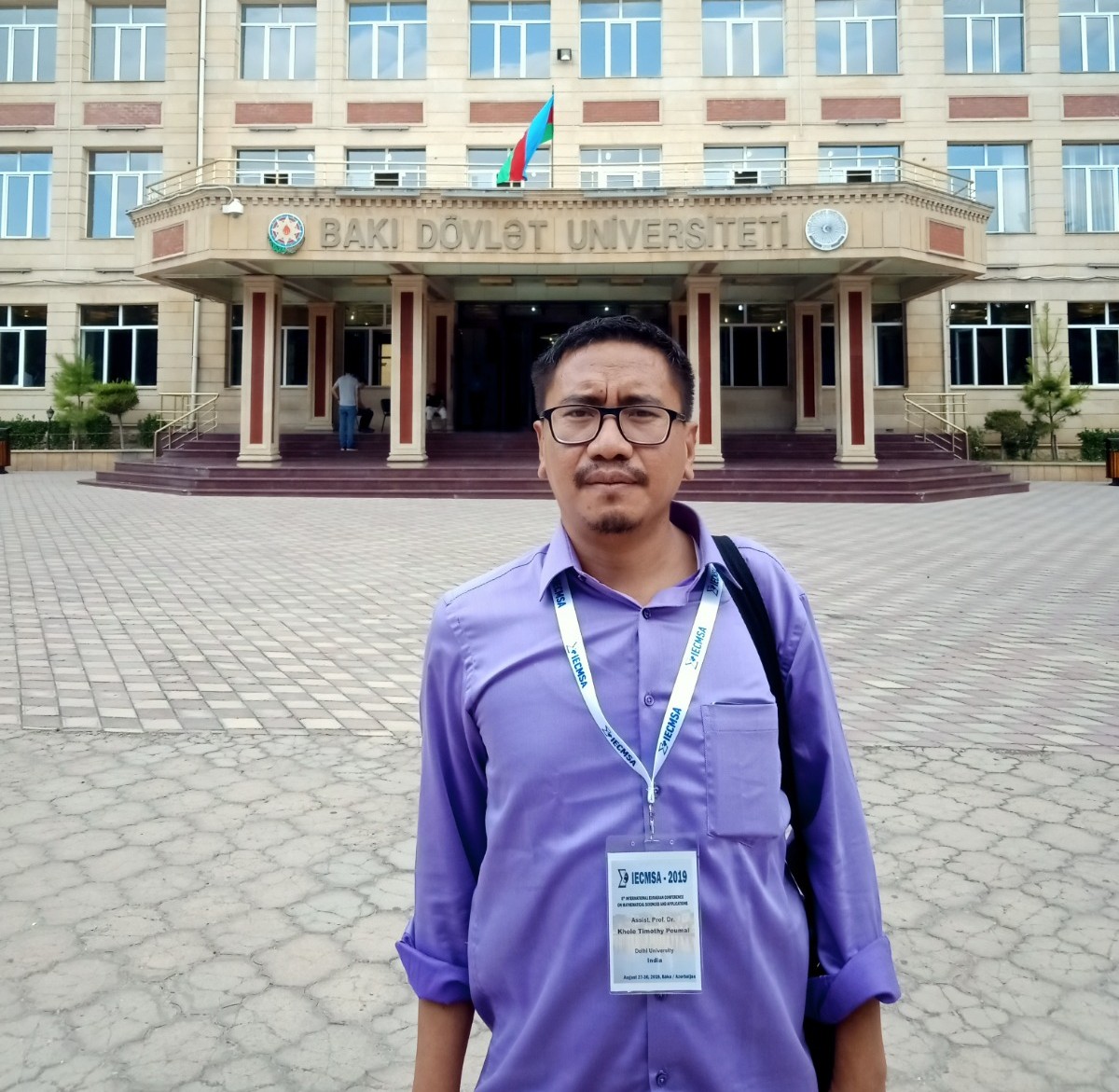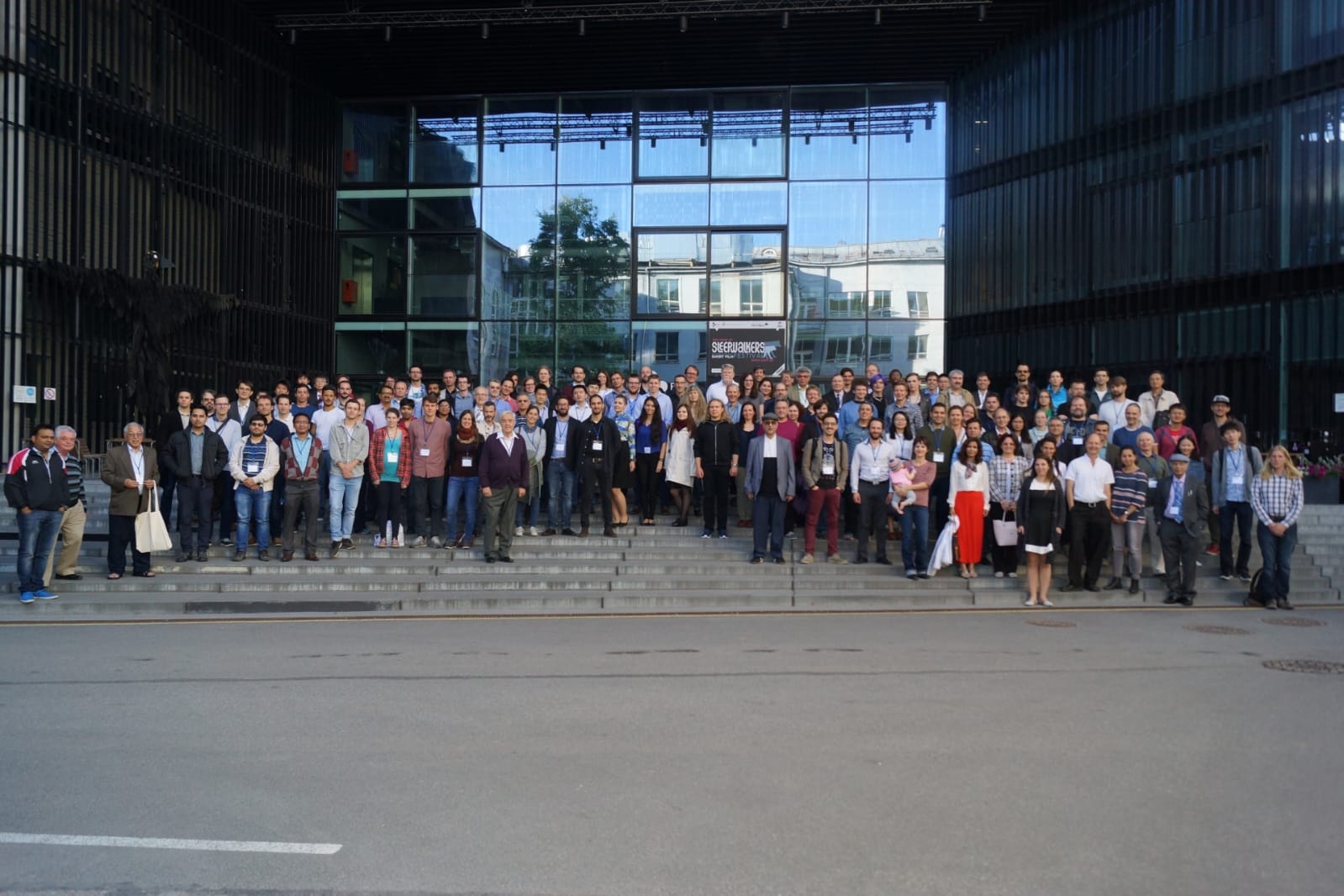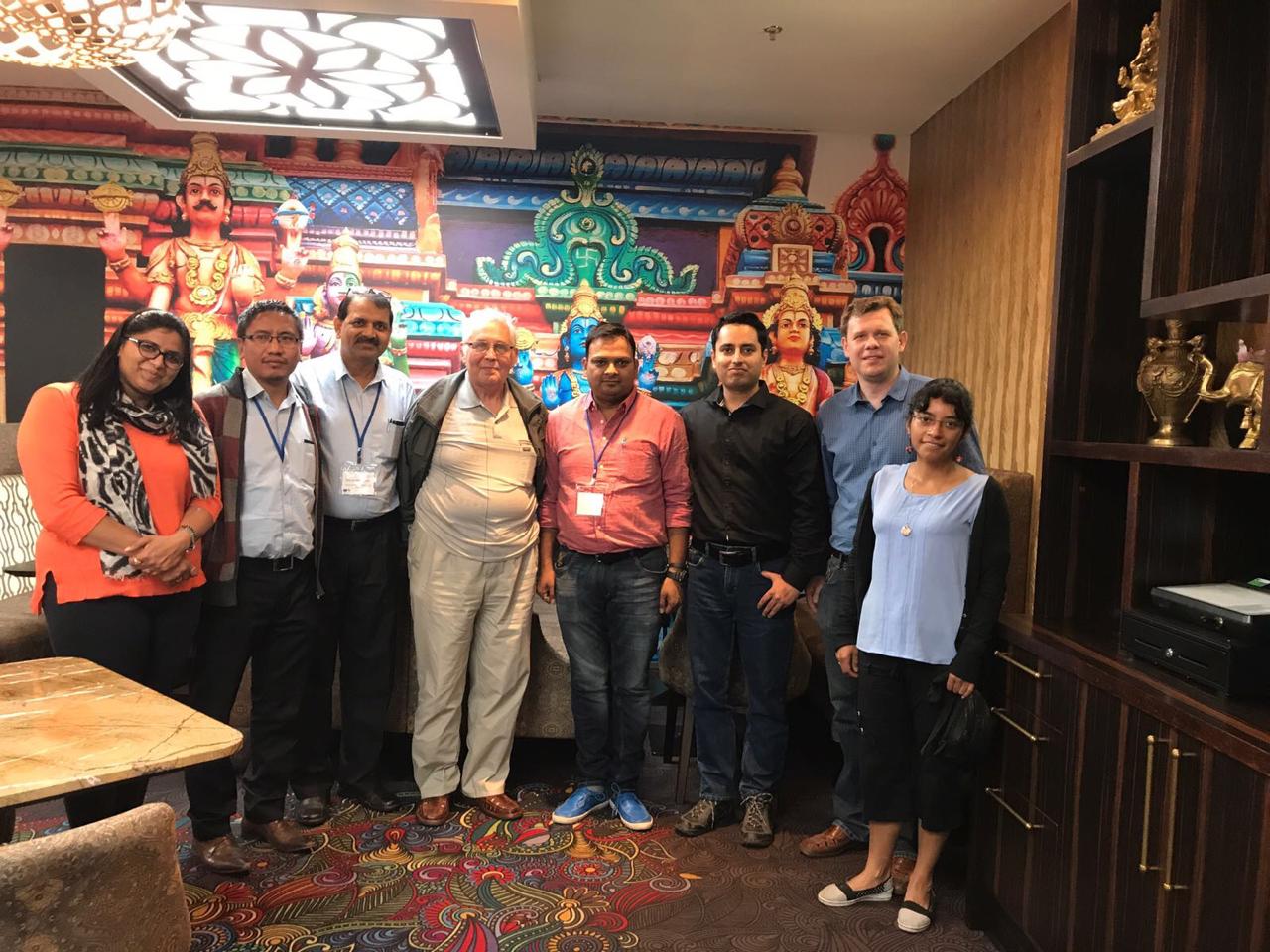 Dr.
Khole Timothy Poumai at International Conference in Baku, Azerbaijan
Dr.
Khole Timothy Poumai at International Conference in Baku, Azerbaijan
- Khupunai H
DIMAPUR — For
many students, Mathematics can seem like an intimidating subject, but for Dr.
Khole Timothy Poumai, it has been a lifelong passion that led him to national
and international recognition. As the first Naga mathematician to become a professor at
Delhi University, he has paved the way for aspiring students from the Northeast
to dream big.
- Dr. Poumai specialises in frames, wavelet theory, digital
signal processing, and quantum mechanics. With 29 international research
publications to his name and years of experience guiding Ph.D. scholars, his
contributions to Mathematics are widely recognised. He has also represented
India on global platforms, delivering invited talks at international
conferences.
- In this exclusive interview with Eastern Mirror, Dr. Poumai
shares insights into his academic journey, research contributions, and his
advice for aspiring mathematicians.
- Could you share with us your early inspirations and what led
you to pursue Mathematics as your field of interest?
- My early inspiration in Mathematics came from experiences
that sparked my curiosity and fascination with problem-solving. I remember the
thrill of solving a challenging puzzle and realising the power of Mathematics
to explain the world around me. Whether discovering patterns in nature,
tackling a difficult equation, or experiencing the thrill of seeing real-life
problems converted into mathematical problems and solved using mathematical
tools, those moments deepened my interest. The sense of accomplishment I felt
when I grasped complex concepts or solved tough problems fuelled my passion to
make Mathematics a lifelong pursuit.
- What does being the first Naga Mathematics professor at
Delhi University mean to you personally, and how do you believe it can
influence our community?
- This achievement means a great deal to me, as it symbolises
not only my academic success but also the overcoming of a deep-rooted phobia of
Mathematics within our community. Growing up in a tribal area where Mathematics
was often feared and perceived as something out of reach, becoming the first
Naga Mathematics professor at Delhi University was both a proud moment and a
significant milestone. It shows that with perseverance, anyone can conquer
their fears and succeed, no matter their background. I hope my journey will
inspire others in our community to overcome their fear of Mathematics, pursue
their academic dreams, and believe in their own potential.
- For aspiring mathematicians, what educational qualifications
and skills are essential in today’s academic and professional landscape?
- For educational qualification, one needs a strong foundation
in Mathematics which typically begins with a bachelor’s degree in Mathematics
and advanced degrees (like master’s or Ph.D.), which are essential for
research, academic, or specialised roles. Core knowledge in areas such as
calculus, linear algebra, probability, and data analysis is crucial, and
mastering some specialised fields such as number theory, topology, functional
analysis or applied mathematics along with technical skills like programming
(Python, MATLAB) and proficiency in statistical or computational tools is
highly valuable in modern mathematical careers.
- Critical skills that include logical reasoning,
problem-solving, and abstract thinking, combined with strong communication and
collaboration abilities for interdisciplinary work. Adaptability and continuous
learning are vital to staying updated with advancements, making networking,
research, and skill-building indispensable for success in this evolving field.
- Are there specific internships, projects, or extracurricular
activities you recommend for students to gain exposure in Mathematics or
related disciplines?
- For students in India, there are various opportunities to
gain exposure to Mathematics at different educational levels. Middle school
students can participate in Mathematics clubs, the Indian National Mathematics
Olympiad (INMO), and online Mathematics challenges to build foundational
skills. High school students can compete in the INMO, apply for research
internships at institutions, and participate in Mathematics competitions or
engage in coding challenges like those on Kaggle and CodeChef.
- Undergraduate students can engage in summer research
programmes, internships at research institutes, and mathematical modelling
competitions, while also exploring online courses to deepen their knowledge.
Graduate students can pursue research fellowships, attend international
conferences, collaborate with industries, and contribute to academic
publications. These activities provide valuable exposure and practical
experience that help students advance in Mathematics and related fields.
 International
Conference at Tallinn, Estonia
International
Conference at Tallinn, Estonia
- What practices or habits have helped you stay focused and
committed to your career goals over the years?
- Setting clear, long-term research goals while breaking them
into smaller, manageable milestones helps maintain direction and motivation.
Developing a disciplined routine with dedicated time for reading,
problem-solving, and writing ensures consistent progress. Staying curious and
fostering a genuine passion for learning drives sustained engagement,
especially when tackling challenging problems. Regularly engaging with the
mathematical community through seminars, conferences, and collaborative
projects helps expand knowledge, gain new perspectives, and remain inspired.
- Equally important is maintaining resilience and patience, as
research often involves long periods of trial and error. Keeping a research
journal to track ideas, progress, and setbacks can be a valuable tool for
reflection and improvement. Seeking mentorship and feedback from other
experienced researchers can provide guidance and keep you grounded. Balancing
work with activities like exercise, mindfulness, or hobbies ensures mental
clarity and prevents burnout.
- Lastly, staying adaptable and open to exploring
interdisciplinary connections can breathe new life into research, keeping it
aligned with both personal interests and emerging trends in Mathematics.
- What role do educators and parents play in encouraging
students to pursue their passions and careers in STEM (Science, Technology,
Engineering and Mathematics) fields?
- The teachers/educators can inspire interest in STEM by designing
engaging, hands-on learning experiences, such as experiments, coding projects,
or Mathematics puzzles that make these subjects exciting and relatable. They
can also identify students’ strengths early on, offer personalised guidance,
and connect classroom concepts to real-world applications to demonstrate the
impact of STEM in everyday life.
- Parents, on the other hand, can encourage exploration by
exposing children to STEM resources such as books, documentaries, educational
apps, or science kits, and by supporting participation in extracurricular
activities like science clubs, or Mathematics competitions. Open communication
about career opportunities in STEM and promoting role models such as renowned
scientists, engineers, or mathematicians can help inspire students and break
down stereotypes.
- Both educators and parents should emphasise a growth
mindset, encouraging students to view challenges as opportunities to learn
rather than as failures. They can foster resilience and confidence by praising
effort and perseverance instead of just results. Collaborative efforts, like
attending science fairs, webinars, or STEM workshops together, can further
deepen a child’s interest. Ultimately, providing a supportive environment where
curiosity, exploration, and creativity are valued lays the foundation for
students to confidently pursue STEM careers.
- What excites you most about Mathematics, and how do you
approach solving complex problems?
- One of the most exciting aspects of Mathematics is its
ability to uncover patterns, solve real-world problems, and provide a logical
framework to understand the universe. Mathematics is both deeply abstract and
incredibly practical, connecting fields like physics, computer science,
engineering, biology, and economics. It challenges the mind with its puzzles
and theories while also offering the satisfaction of elegance and precision
when a problem is solved.
- To solve complex problems, I begin by thoroughly
understanding the problem, identifying key variables, and breaking it down into
smaller, manageable parts. I then devise a plan, considering different
approaches or strategies, and experiment with solutions through trial and
error, carefully verifying each step. Throughout the process, I stay adaptable,
regularly reassessing my approach and analysing progress. Once a solution is
found, I confirm its correctness, reflect on the methods used, and explore how
it can be generalised or applied to other problems.
- What do you hope to accomplish in the next phase of your
career, and what are your dreams for the future of Mathematics in India?
- My focus for the next phase of my career is to continue
deepening my research while fostering a collaborative and supportive
environment for students and colleagues. I hope to inspire and mentor young
mathematicians, guiding them to explore new areas of inquiry and helping them
develop the skills they need to tackle complex problems. A key part of my work
will also be to contribute to the advancement of Mathematics education in
India, making it more engaging and accessible for students at all levels.
- Looking ahead, I dream of a future where Mathematics in
India plays an even more prominent role, not just in academia but also in
tackling real-world challenges. I would love to see more opportunities for interdisciplinary
collaboration that connects Mathematics to fields like technology, healthcare,
and environmental sustainability. With more investment in research, more
platforms for collaboration, and greater support for students from diverse
backgrounds, India could emerge as a global leader in mathematical research and
innovation, with its contributions shaping the future of science and
technology.
- How do you balance your personal life and professional
achievements, and what keeps you motivated every day?
Maintaining a good work-life balance is something I work on
consciously, making sure I prioritise both aspects. I try to maintain clear
boundaries between work and personal time, ensuring I carve out space for
family, hobbies, and self-care, even during busy stretches. Staying organised
and breaking down tasks into smaller, manageable steps helps me stay on track,
and I stay flexible enough to adjust when life throws curveballs. Taking
regular breaks and engaging in activities outside of work keeps me refreshed
and prevents burnout.
My motivation comes from a mix of my love for Mathematics
and the joy of working with others, whether it is solving challenging problems
or guiding students as they grow. The impact Mathematics can have on real-world
issues keep me driven, knowing that my work, no matter how small, contributes
to something bigger. The satisfaction of learning, growing, and seeing those
around me succeed is what keeps me inspired every day.
 International
Conference at Tallinn, Estonia
International
Conference at Tallinn, Estonia-
-
- Rapid Insights:
- One word to describe your journey in Mathematics.
- Evolving.
- The most challenging mathematical concept you've worked on.
- Digital signal processing.
- Books or resources every aspiring mathematician should read.
- "How to Solve It" by George Pólya, “Significant
Figures” by Ian Stewart, and “Fermat’s Last Theorem” by Simon Singh.
-
- (The writer is a Master's student at North-Eastern Hill
University, Shillong. She is currently an intern at Eastern Mirror)
 Dr.
Khole Timothy Poumai at International Conference in Baku, Azerbaijan
Dr.
Khole Timothy Poumai at International Conference in Baku, Azerbaijan International
Conference at Tallinn, Estonia
International
Conference at Tallinn, Estonia International
Conference at Tallinn, Estonia
International
Conference at Tallinn, Estonia